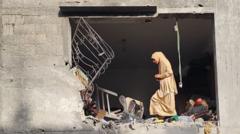In a recent and deadly escalation of conflict, Israel has intensified its air strikes in Gaza, with officials announcing plans for a broad military campaign aimed at seizing control of significant areas of the territory. Israeli Defence Minister Israel Katz stated that this operation is focused on dismantling "terrorist infrastructure" while requiring the evacuation of many residents. Reports indicate that recent strikes have led to the deaths of numerous civilians, including children, raising urgent humanitarian concerns amid a heightened atmosphere of fear and displacement.
Israeli Offensive Intensifies as Strikes in Gaza Claim Lives

Israeli Offensive Intensifies as Strikes in Gaza Claim Lives
Escalating violence in Gaza as Israel's military expands its operations, resulting in significant civilian casualties.
The situation in Gaza has reached a critical point as air strikes over the last few days resulted in the tragic deaths of at least 31 Palestinians in various incidents, including a significant strike involving a UN clinic in Jabalia that was sheltering displaced families.
At least 12 people reportedly lost their lives in an overnight bombing of a home in Khan Younis, while subsequent attacks on a UN facility, claimed to be a hideout for Hamas militants, led to another 19 fatalities, including children. Local hospitals and Civil Defence units have been overwhelmed as they respond to the surge in casualties, which military sources claim is part of a strategy to apprehend Hamas operatives.
The Israeli military has maintained that it is specifically targeting Hamas, describing the operations as essential for national security while employing measures to minimize civilian casualties. However, the impact on the population has been devastating, with eyewitness accounts detailing the chaos and trauma surrounding the strikes.
In tandem with aerial bombardments, Israeli ground forces have reportedly advanced into strategic areas, resulting in increased military presence in the southern Gaza city of Rafah. Over recent weeks, Israel has issued evacuation orders affecting approximately 140,000 residents, indicating a growing expectation of a major offensive on the ground.
The humanitarian crisis in Gaza continues to worsen, as restrictions on aid delivery have intensified since early March, exacerbating living conditions for thousands of civilians. The ongoing conflict, reignited by a large-scale attack on October 7, 2023, has claimed more than 50,000 lives according to reports from the health ministry, illustrating the dire situation affecting the enclave.
International responses have included calls for dialogue and ceasefire, highlighting the urgent need to protect civilians and seek resolutions that prioritize humanitarian access and the release of hostages from both sides. As the conflict escalates, the situation remains fluid, with serious implications for both regional stability and humanitarian efforts in the affected areas.
At least 12 people reportedly lost their lives in an overnight bombing of a home in Khan Younis, while subsequent attacks on a UN facility, claimed to be a hideout for Hamas militants, led to another 19 fatalities, including children. Local hospitals and Civil Defence units have been overwhelmed as they respond to the surge in casualties, which military sources claim is part of a strategy to apprehend Hamas operatives.
The Israeli military has maintained that it is specifically targeting Hamas, describing the operations as essential for national security while employing measures to minimize civilian casualties. However, the impact on the population has been devastating, with eyewitness accounts detailing the chaos and trauma surrounding the strikes.
In tandem with aerial bombardments, Israeli ground forces have reportedly advanced into strategic areas, resulting in increased military presence in the southern Gaza city of Rafah. Over recent weeks, Israel has issued evacuation orders affecting approximately 140,000 residents, indicating a growing expectation of a major offensive on the ground.
The humanitarian crisis in Gaza continues to worsen, as restrictions on aid delivery have intensified since early March, exacerbating living conditions for thousands of civilians. The ongoing conflict, reignited by a large-scale attack on October 7, 2023, has claimed more than 50,000 lives according to reports from the health ministry, illustrating the dire situation affecting the enclave.
International responses have included calls for dialogue and ceasefire, highlighting the urgent need to protect civilians and seek resolutions that prioritize humanitarian access and the release of hostages from both sides. As the conflict escalates, the situation remains fluid, with serious implications for both regional stability and humanitarian efforts in the affected areas.




















